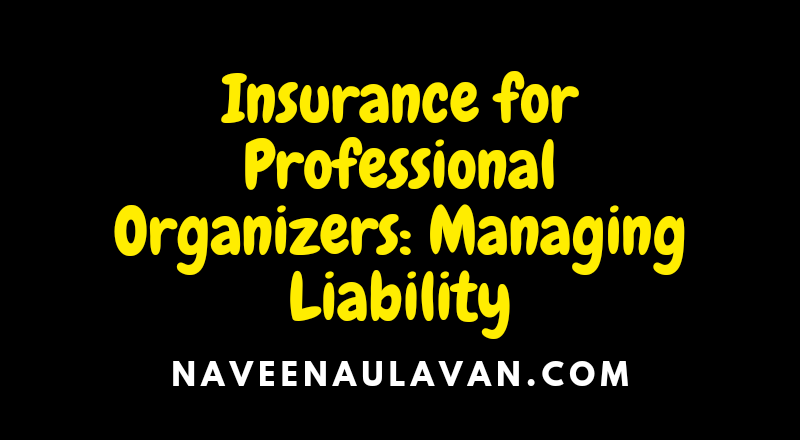Professional organizers play a crucial role in helping individuals and businesses declutter and streamline their spaces. However, like any profession, there are potential risks involved. From accidental property damage to allegations of negligence, professional organizers must be prepared to manage their liability. One key tool in this management is insurance. In this article, we will explore the various types of insurance coverage that professional organizers should consider to protect themselves and their clients.
Understanding the Risks
Before diving into insurance options, it is essential to understand the risks faced by professional organizers. These risks can vary depending on the nature of the work and the specific circumstances. Some common risks include:
Property Damage
During the organizing process, there is always a possibility of accidental damage to clients’ property. For example, a valuable heirloom may get broken or a wall may get scratched while moving furniture. In cases like these, the professional organizer may be held liable for the cost of repair or replacement.
Data Breach
With the increasing reliance on digital tools and systems, professional organizers often handle client information, including contact details, financial records, or confidential documents. If a data breach occurs due to inadequate security measures, the organizer may face legal consequences and financial loss.
Injury Claims
Professional organizers frequently work in clients’ homes or office spaces. If a client or their visitor suffers an injury during the organizing process, the organizer may be held accountable for medical expenses, rehabilitation costs, or even legal fees.
Negligence Allegations
In some cases, clients may claim that the professional organizer failed to fulfill their duties adequately. These allegations could relate to the quality of service, advice provided, or promised results. Defending against such claims can be costly and time-consuming, even if they’re unfounded.
Types of Insurance Coverage
To mitigate the potential financial harm arising from these risks, professional organizers should consider securing appropriate insurance coverage. While the specific needs may vary depending on the business size and scope of services, here are some essential insurance policies to consider:
General Liability Insurance
General liability insurance is a foundational policy that covers third-party bodily injury, property damage, and associated legal expenses. It provides financial protection if a professional organizer is sued by a client or a visitor who suffered an injury on the premises or incurred property damage.
Professional Liability Insurance
Professional liability insurance, also known as errors and omissions insurance, is designed to protect against claims of negligence, errors, or omissions in professional services. It covers legal costs, settlements, or judgments resulting from alleged professional mistakes or failure to perform duties.
Commercial Property Insurance
Commercial property insurance provides coverage for physical assets, such as office space, furniture, tools, and equipment used in the course of the organizing business. This policy helps protect against perils, including fire, theft, vandalism, or natural disasters, by covering repair or replacement costs.
Business Interruption Insurance
Business interruption insurance is vital for professional organizers who rely heavily on their premises to conduct their operations. It provides coverage for lost income and additional expenses incurred due to a covered event that temporarily interrupts business activities, such as a fire or a natural disaster.
Cyber Liability Insurance
As professional organizers handle clients’ sensitive data, cyber liability insurance is becoming increasingly important. This policy protects against financial losses resulting from data breaches, including legal fees, notification costs, credit monitoring for affected individuals, and potential regulatory fines.
Choosing the Right Insurance Provider
Selecting the right insurance provider is crucial to ensure comprehensive coverage and excellent customer service. Here are some factors to consider when choosing an insurance provider:
Experience and Expertise
Look for providers with experience in insuring professional organizers specifically. They should understand the unique risks and needs of your profession.
Policy Customization
Every organizing business is different, so find an insurance provider that offers flexible coverage options that can be tailored to meet your specific requirements.
Financial Stability
Evaluate the financial stability of the insurance company to ensure they have the resources to fulfill their obligations in the event of a claim.
Claims Handling
Research the company’s reputation for efficient and fair claims handling. Look for reviews or testimonials from other policyholders.
Premium Costs and Deductibles
Compare the premium costs and deductibles across multiple providers to ensure you’re getting the best value for your insurance investment.
Conclusion
Insurance is a critical component of managing liability for professional organizers. By understanding the risks, analyzing their specific needs, and securing appropriate insurance coverage, professional organizers can protect themselves and their clients from potential financial losses. General liability insurance, professional liability insurance, commercial property insurance, business interruption insurance, and cyber liability insurance are all important policies to consider. When choosing an insurance provider, factors such as experience, policy customization, financial stability, claims handling, and premium costs should be taken into account. By investing in the right insurance coverage, professional organizers can focus on their work with peace of mind, knowing that they are prepared for any unexpected events and their liability is managed effectively.
